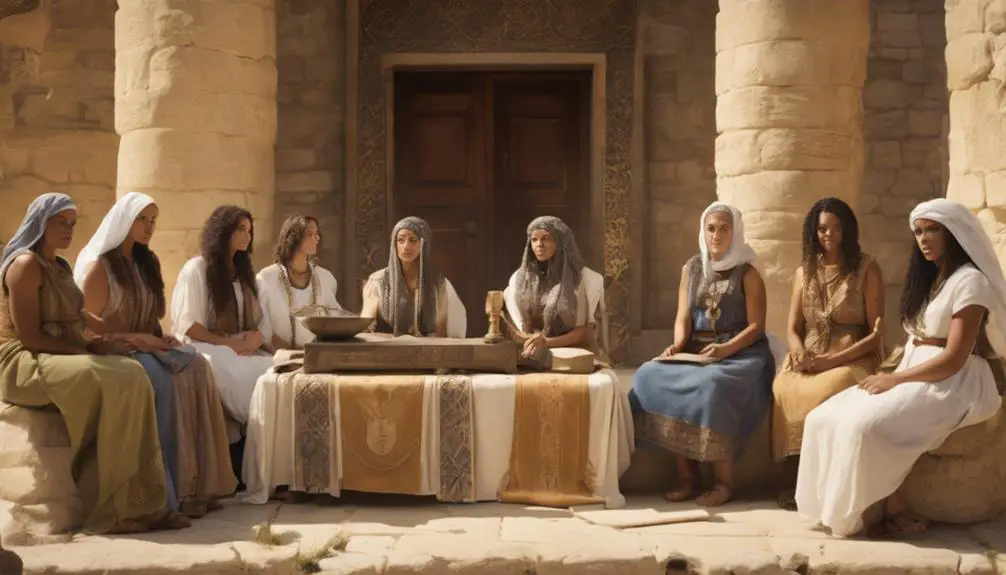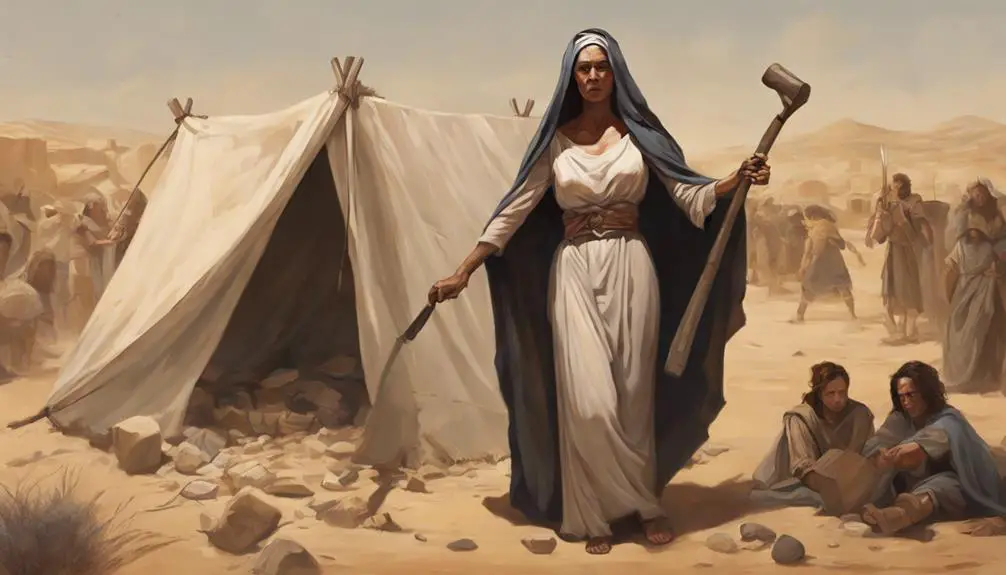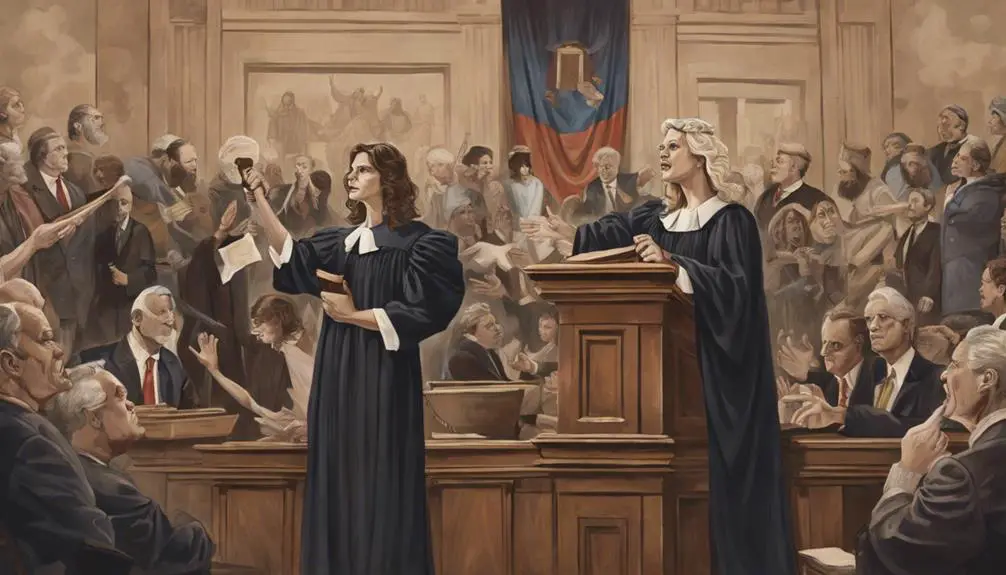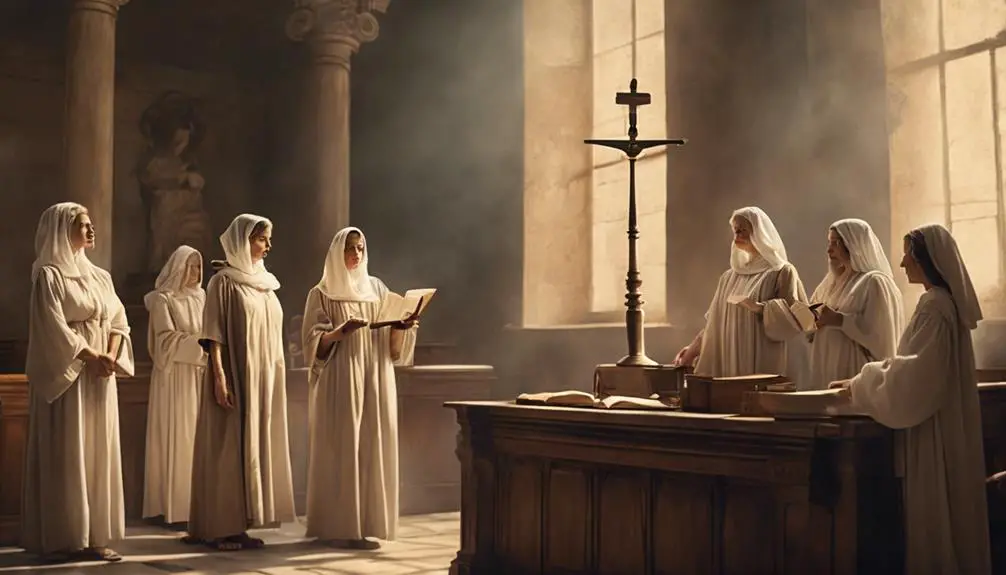Highlighting the tales of Deborah and Jael, explore how female judges in the Bible redefined gender roles in a patriarchal society.

Female Judges in the Bible
Have you ever wondered about the role of women in biblical times, particularly those who held positions of authority such as judges?
Notably, figures like Deborah and Jael, who emerged as leaders in a predominantly patriarchal society, present an intriguing study.
Unpacking their narratives, you'll uncover layers of strength, wisdom, and resilience.
But what implications do their stories bear on our understanding of gender roles in ancient times?
Let's embark on this exploration, and you may find that these women's narratives challenge many preconceived notions you hold about biblical gender dynamics.
Understanding Biblical Judges' Role

To grasp the significance of female judges in the biblical narrative, you must first understand the multifaceted role of a judge in the biblical context. Their judicial duties extended beyond mere arbitration; they were leaders, military strategists, and often spiritual guides. Essentially, they filled a void in the absence of a king, providing order and stability.
Biblical interpretations often highlight the judges' divinely inspired wisdom, enabling them to discern right from wrong and impart justice impartially. Their decisions held substantial weight, shaping societal norms and religious practices. You'll also find instances where judges were instrumental in delivering Israelites from their oppressors, a testament to their military prowess.
Understandably, the position was a respected one, and the judges' authority was seldom questioned. However, it's also important to note that their power wasn't absolute. Judges were accountable to a higher power – God. Their authority was contingent upon their obedience and faithfulness to God's commands.
In this light, the significance of female judges becomes even more pronounced. They not only shattered the gender norms of their time but also demonstrated exceptional leadership, wisdom, and faith–traits that were considered essential for a judge. The presence of female judges is a testament to the egalitarian nature of biblical justice.
Profile of Deborah: A Prophetess Judge

Among the cadre of biblical judges, Deborah stands out not only as a woman, but also as a prophetess, exhibiting extraordinary leadership and spiritual depth. Her unique role carries significant implications, especially considering the patriarchal context of her time.
The significance of her prophetess role shouldn't be understated. As a prophetess, Deborah communicated directly with God, receiving divine revelations and sharing them with her people. She wasn't just a conduit of the divine will but also a spiritual guide, offering wisdom and direction in tumultuous times.
Analyzing Deborah's leadership style, you'll notice her wise, assertive, and compassionate approach. She didn't lead through force or intimidation, but rather through wisdom and inspiration. As a judge, she delivered fair verdicts, settling disputes, and ensuring justice. She was a leader who commanded respect, not through power, but through her integrity and spiritual authority.
Deborah's role as a prophetess and a judge highlights the important roles women have played in religious narratives, often overlooked in traditional interpretations. Her leadership style and the significance of her prophetess role offer valuable insights into the diverse ways leadership and spiritual authority were embodied in biblical times.
The Impact of Judge Jael

Shifting our focus to Jael, another remarkable female judge in the Bible, we find her impact is no less profound than Deborah's, embodying courage and decisive action in crisis situations. Jael's strategy was unique, relying on her cunning and personal strength rather than armies or public oratory. You can observe in her story that she was unafraid to use her home as a battlefront and her hospitality as a weapon.
Jael's leadership lessons are equally striking. She demonstrates that leadership can emerge in any context, even the most unexpected. You see, courage isn't limited to the battlefield, and influence isn't restricted to the public sphere.
Here's a simple table to encapsulate Jael's impact:
Jael's Strategy |
Leadership Lessons |
|---|---|
Cunning and personal strength |
Leadership can emerge in any context |
Used home as a battlefront |
Courage isn't limited to battlefield |
Used hospitality as a weapon |
Influence isn't restricted to the public sphere |
Female Judges: Challenges and Triumphs

While considering the impacts of leaders like Jael, it's crucial to recognize the challenges and triumphs faced by these female judges, as their experiences shed light on the complexities of their roles and the resilience they exhibited. Gender bias was a significant hurdle these women faced, battling ingrained societal perceptions that often marginalized their influence and authority. Despite this, their triumphs were noteworthy, signaling a shift in the social fabric of the times.
Social perceptions were a double-edged sword. On one hand, they were confronted with stereotypes that sought to limit their potential. On the other, they emerged as symbols of strength, challenging norms and redefining the limits of their roles. In a society generally dominated by men, their leadership was a testament to their courage and determination.
Their triumphs weren't just individual victories but represented a collective triumph for women. They broke barriers of gender bias, paving the way for future female leaders. Their influence extended beyond their immediate roles, seeping into the social psyche and gradually transforming perceptions. These women's fortitude in the face of adversity offers a profound testament to their resilience and determination, shedding light on the complexities and triumphs of their roles.
Legacy of Biblical Female Judges

The enduring legacy of biblical female judges, enshrined in ancient scriptures, continues to inspire, demonstrating that their influence wasn't confined to their time but has transcended generations. These women, often deemed as 'Unsung Heroines,' left imprints that can't be ignored when interpreting biblical narratives.
Analyzing various Biblical Interpretations, you'll find instances where these judges' wisdom, courage, and faith have become paradigms for leadership, especially in contexts where women's roles are typically diminished. They were trailblazers, challenging traditional norms and power structures, thereby setting precedents not only for their contemporaries but for future generations.
The impact of these female judges becomes evident when you see their stories being used as a source of encouragement, inspiration, and instruction in today's faith communities. Their lives serve as reminders that God's call and empowerment aren't bound by gender, a concept that's revolutionary even in today's context.
Conclusion
You've journeyed through the impactful lives of biblical female judges like Deborah and Jael, witnessing their triumphs and challenges. It's fascinating that, in a period when women leaders were rare, they presided over critical national matters.
Indeed, an intriguing fact is that Deborah's leadership brought 40 years of peace – a feat unmatched by any other judge. These women's legacies permeate history, reminding us of the power of female leadership in even the most patriarchal societies.



Sign up